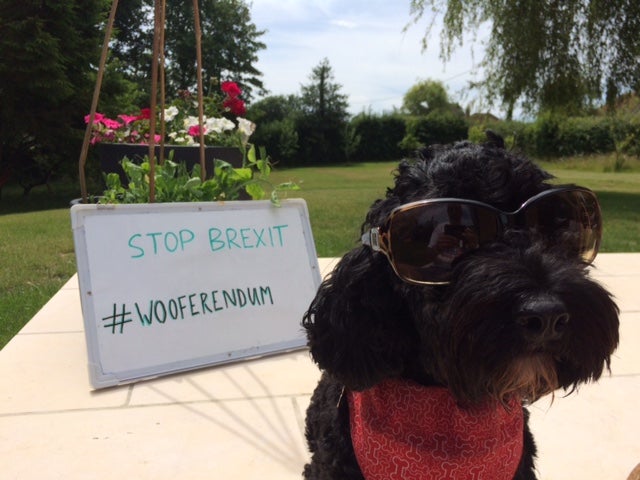'Dogs against Brexit' to march on Parliament to demand new EU referendum
'Wooferendum' stunt aims to highlight fears of shortages of qualified vets and pet medicines
Anti-Brexit dog owners are to take their pets on a march to parliament on Sunday to call for a second vote on EU membership.
The campaigners, who hope thousands of protesters and canines will rally, claim that leaving the bloc will harm the UK’s estimated 54 million pets.
They fear it will mean a shortfall in skilled vets and veterinary nurses, rising costs for animal health products and even supplies running low.
Organisers of the “wooferendum” march say more than half of vets registering in the UK each year come from abroad, mostly from the EU, and they cite a report by the Royal College of Veterinary Surgeons (RCVS) saying a cut in numbers would be likely to cause shortages, jeopardising animal welfare and economic production.
The college has warned that around nine in 10 vets working in public health roles, such as abattoirs, come from other EU states, so meat production could be affected.
The vets’ leaders have called for Brexit negotiations to ensure there are no restrictions on the free movement of EU-qualified vets and veterinary nurses or on access to evidence that would jeopardise UK research for animal welfare.

Surveys have found a higher proportion of EU-trained vets in the UK work full-time than average among those in the profession.
The marchers also point out that the National Office of Animal Health has said a no-deal Brexit could mean shortages of up to 40 per cent of animal health products, such as vaccines, painkillers, antibiotics and wormers, and buyers having to pay more.
“We know Brexit will be disastrous for the people of Britain but it could also be equally bad for our pets,” said Dominic Dyer, animal welfare campaigner and a march organiser.
“If Brexit causes another recession on the scale of the financial crash of 2008, we can even expect to see plunging living standards, forcing many people to give up their pets, leaving charities and shelters struggling to cope.”
Join our commenting forum
Join thought-provoking conversations, follow other Independent readers and see their replies
Comments
Bookmark popover
Removed from bookmarks